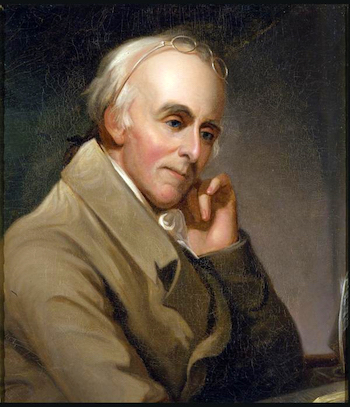Book Review: “The Science of Abolition” — See No Evil
By David Mehegan
Oh yes, they thought that to treat human beings like livestock was backward and doomed and obsolete and unscientific and fatally inefficient, but if any of them thought it was indefensibly cruel and morally intolerable, they show no awareness by the evidence of this book.
The Science of Abolition: How Slaveholders Became the Enemies of Progress by Eric Herschthal. Yale University Press. 326 pp. Illustrated. $32.50.

The candidate for the doctoral degree in history naturally seeks to find a thesis and argument that is new. This was clearly the case with Eric Herschthal, assistant professor of history at the University of Utah, who in this version of his dissertation (at Columbia University) seeks to show the degree to which opponents of slavery in the 18th and 19th centuries mobilized scientific thinking in their arguments. This he does capably, with a flood of scholarship, and the book is a clearly written survey of a long succession of science-minded thinkers. Yet this reader still found it hard to figure out the argument, or specifically why it matters, how it changes anything of importance in the history of abolition. All knowledge is worthwhile, but unless seen as an episode in the history of science, this account seems like a small sideshow to the story of abolition.
The book has a fairly simple thesis. Whereas religious abolitionists, such as the Quakers, regarded slavery as an evil to be repented, Herschthal writes that “antislavery scientific discourse amounts to what I call the science of abolition — a wide range of scientific arguments that helped legitimate the antislavery movement and that ultimately cast slaveholders as unscientific and premodern: the enemies of progress.” The mechanics of the book is linear: for the most part, a long series of pocket profiles, beginning with American physician and politician Benjamin Rush, proceeding through Benjamin Franklin, Josiah Wedgwood, and a long line of less well-known figures in Europe and the United States who saw slavery as a problem to be solved by technology or innovative agricultural methods — the low-cost route to redemption. We learn of much that they said and did, and how little it mattered in the end.
Book titles often change in the course of publication, but this one changed perhaps more than most. According to Herschthal’s profile on the Utah History Department page, the title was to be The Science of Antislavery: Scientists, Antislavery, and the Myth of Slavery’s Backwardness. The new title changes Antislavery to Abolition. That probably seemed stronger to Yale Press, and yet it creates confusion inasmuch as most of the science-minded actors in this book were not abolitionists.
On that point, an endnote to the Introduction discusses the sometimes ambiguous distinction between the terms antislavery and abolition. Herschthal notes that he uses the words interchangeably in the first five chapters in reference “to anyone who either joined an antislavery society, or whose political views clearly aligned with the ideology of those societies.” However, he continues, in the last chapter, “following other scholars, I reserve abolitionist for members, Black or white, of the [antebellum] era’s antislavery societies. By contrast I use antislavery when referring to more moderate opponents of slavery … in the antebellum era, which includes most of the white men of science in this chapter.”
Here we see a fuzziness as to who these many actors are and what they are after, which dogs the book. To be sure, it is helpful for an author to explain the difference between two important, closely related terms. But to acknowledge (at the end!) that he means them differently in different parts of his book is hardly clarifying.
With a few exceptions (such as Benjamin Franklin and Joseph Priestley), almost none of the characters are experimental scientists; rather, they are dilettantes in natural science. Further, none are abolitionists in the mode of William Lloyd Garrison, Charles Sumner, or Frederick Douglass. Although they believe that slavery is unbecoming a civilized society and ought to go away, effecting its elimination is not the primary goal of any of them.
A foremost example is Benjamin Rush, signer of the Declaration of Independence, who advanced the idea in a 1792 public lecture that dark skin was caused by endemic leprosy in Africa. Find a cure for leprosy, he declared, and Black Americans would turn white, to theirs and everyone’s happiness, leading eventually to their emancipation. Eureka! Black people are really flawed whites! That this bizarre idea, based on no biological or experimental evidence, was respectfully heard and not discredited for decades, is an example of what a loosey-goosey concept science was to the respected minds of the age.
One can see why Yale would also be uncomfortable with “the Myth of Slavery’s Backwardness” in the subtitle, in that “myth” is commonly supposed to mean something unreal. But the change of the subtitle to How Slaveholders Became the Enemies of Progress suggests that slaveholders had previously not been such, as well as that they are the central actors in this story, when they hardly come into it at all as individuals.
It would be more accurate to say that Herschthal’s mission is to explain how men (and a few women) with a scientific outlook deployed, and tried to advance, the argument that slavery was backward, obsolete, and bound for the dustbin of history. The plight and fate of the actual millions of enslaved people, in the here and now, did not seem much to concern them.
One would expect, given his prominence in the book, that Benjamin Franklin must be one of the authentic scientists who used science toward the pursuit of abolition. But no, Herschthal’s extended discussion of Franklin serves mainly to discredit the great man’s antislavery reputation. Yes, he opposed slavery in some vague way, and yes, he was persuaded to serve as president of the Pennsylvania Abolitionist Society. But he owned slaves throughout much of his life and, in his political and diplomatic career, had defended the interests of slaveholders. He found the uncompromisingly abolitionist Quakers to be tiresome fanatics. Likewise Rush, who succeeded Franklin as president of the PAS, believed that the degraded condition of Black people was due to slavery, not to innate capacities. That was a progressive idea for the time, yet Rush too did not find the ownership and merchandising of human beings to be intrinsically intolerable — he bought a Black man in 1784.
This pattern is seen in characters throughout, and Herschthal is well aware of it. The British Lunar Society of the 1760s, composed of Joseph Priestley (discoverer of oxygen), Wedgwood, and Erasmus Darwin (grandfather of Charles), was a proto-abolitionist club whose members believed that advances in practical science would naturally lead to the eventual termination of slavery. Its pronouncements provoked conservative alarm in Britain but, Herschthal writes, “conservatives helped create an image of these men as something they were not: antislavery radicals, unflinchingly committed to slavery’s demise regardless of the pace or on whose terms it was carried out. In truth, their support for abolition shifted depending on the circumstances and according to the degree to which it conformed to an idealized model of gradual progress, one that they had come to associate with their own belief about how science progressed.”

Charles Willson Peale portrait of Benjamin Rush. This signer of the Declaration of Independence advanced the idea in a 1792 public lecture that dark skin was caused by endemic leprosy in Africa.
In the long chapter “A Natural History of Sierra Leone,” the tale of that 1787 British experiment in returning liberated slaves to a colony in West Africa (followed in 1821 by a succession of settlements by free American Blacks which in 1847 became independent Liberia) is told in extensive detail, mostly from the point of view of those who hoped that with scientific management, the colony would prove to be profitable. Here again the founders were motivated by opposition to slavery, but the scientific and practical minds recruited to the enterprise were not primarily motivated by moral outrage.
In the antebellum period in the United States, men of science likewise inclined against slavery, but only up to a point. There were hopes, for example, that the British invention of a flax-processing machine would replace cotton, taking away the need for slave labor in that commodity. That is, no need for cotton, therefore no need for slavery, ergo eventually slavery would wither away. “In part,” Herschthal writes, “northern men of science advocated scientific solutions to slavery because they felt that abolitionists were needlessly pushing the nation toward war. Scientific and technological solutions offered a soothing alternative, one that fit neatly within the enduring Enlightenment belief in scientific progress as the means toward social improvement. Yet another reason … was that some of them, even ones with staunch abolitionist credentials, had lucrative ties to slave owners.”
Although this is not a long book, it is slow reading in places, where Herschthal lingers in the weeds of his research. Josiah Wedgwood’s creation of a ceramic antislavery medal is discussed at length, for example, and yet Wedgwood’s role in advancing the antislavery cause or argument was not significant in any practical way.
One does not normally think of scientific thinkers as naive, but it is remarkable how many of these men could not see the plain truth: that white men held Black people in bondage, and trafficked them like cattle, because their own wealth and power depended upon their right to do so. The slave power itself could and did also marshal “scientific” racism to claim reasoned justification for human bondage. Further, as Isabel Wilkerson makes clear in her new book Caste: The Origins of Our Discontents, the craving for organized domination of a lower class was also at work. Perceptive eyes saw this clearly at the time. William Lloyd Garrison “routinely denounced … scientific solutions of any kind…. Slaveholders kept their captives not for financial reasons, he argued, but for psychological ones — they craved the power far more than the money.” And Frederick Douglass said in 1854, “The neutral scholar is an ignoble man…. Scientific writers, not less than others, write to please.” They might “sacrifice what is true to what is popular.”
Still, the role of wealth and power is and was undeniable, and many slaveholders were not shy about admitting it. The South Carolina delegates to the 1787 Constitutional Convention made clear in cold and blunt terms that they would never join a new government that interfered with the slave trade. “Religion and humanity had nothing to do with the question,” said delegate John Rutledge. “Interest alone is the governing principle with nations.” (Quoted in Richard Beeman, Plain, Honest Men: The Making of the American Constitution).
In retrospect, we know what ended slavery, and nothing else could have done it: four years of butchery, and the flight of countless captives to Union lines whenever they had the chance.
There is a strangely bloodless tone to the “scientific” arguments on behalf of abolition. All this cool intellection! Perhaps it was just that these polite gentlemen, with their beakers and scientific clubs, had never seen slavery in action,the horrors of the Middle Passage, or the whippings, rapes, and brutal sundering of families. They operated on a transcendent plane. Oh yes, they thought that to treat human beings like livestock was backward and doomed and obsolete and unscientific and fatally inefficient, but if any of them thought it was indefensibly cruel and morally intolerable, they show no awareness by the evidence of this book. The word “evil” seems never to appear in their speeches and writings, presumably because, as John Rutledge might say, good and evil had nothing to do with the question.
David Mehegan is the former Book Editor, and writer on books, authors, and publishing, for the Boston Globe.
Tagged: David Mehegan, Eric Herschthal, How Slaveholders Became the Enemies of Progress, Slavery
